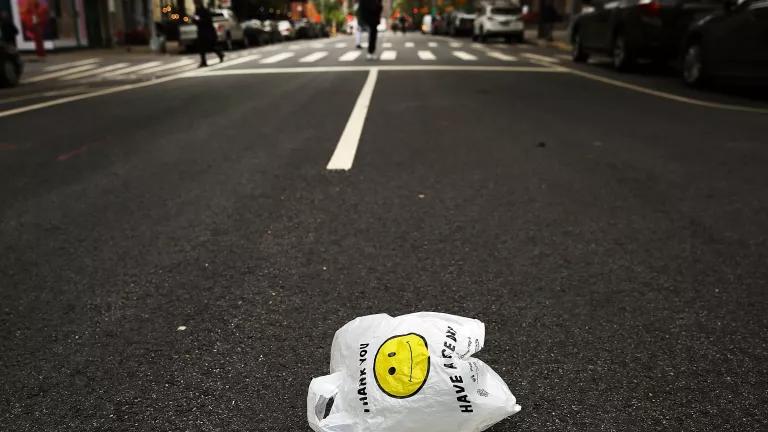What Does the Plastic Bag Ban Mean for New Yorkers?
Here’s everything you need to know before plastic carryout bags disappear from the Empire State on March 1.

New Yorkers use a staggering 23 billion plastic bags each year—and when we’re done with them, they clog our waterways, harm wildlife, litter streets, and overburden our waste-management systems. More importantly, our dependency on these single-use plastics, which are made from petrochemicals, increases the planet-warming greenhouse gas emissions that are fueling climate change. But that’s about to change. The long-awaited plastic bag ban has finally made it to the Empire State. NRDC lawyer, plastic pollution expert, and New York environmental leader Eric Goldstein is here to explain the details.
When does New York’s plastic bag ban start?
The plastic bag ban officially begins March 1 across New York State. It affects all retailers, from big-box outlets and department stores to convenience stores and neighborhood bodegas. The state plans to first focus on educating retailers and consumers and will then begin enforcing the ban with penalties in a few months. (Violators will get a $250 fine after their first infraction and a $500 fine after a second in the same calendar year.)
Will stores offer paper bags instead?

Many stores will still offer paper bags at the register—but they may cost you. The law leaves it up to individual cities and counties to decide whether to institute a 5 cent fee on paper bags, which carry an environmental toll of their own. New York City, for example, has mandated such a fee on all paper carryout bags; it also takes effect on March 1. “The top of the solid-waste hierarchy is still to simply not generate waste in the first place,” Goldstein says. He encourages residents to opt for reusables over paper bags. Under state law, certain low-income residents are exempt from the paper bag fee, including SNAP (Supplemental Nutrition Assistance Program) recipients.
Can I still buy trash bags in New York?
Yes. There are a number of products excluded from the plastic bag ban—boxed plastic trash bags for home use being one of them. Others include plastic bags to wrap uncooked meat or fish, those used at bulk bins (though BYO containers are catching on among bulk-bin shoppers), and those provided by a pharmacy to carry prescription drugs. Stores are also allowed to sell durable plastic bags as reusables; to qualify in this category, a bag needs to be at least 10 mils thick (a “mil” is a thousandth of an inch), hold at least 22 pounds, and have a minimum life span of 125 uses. For a full list of exemptions, check the state’s website here.
What about bags for my takeout or delivery food?
Unfortunately, New York will still permit plastic bags to be used for “prepared-to-order” food like takeout or delivery—a point of contention for many environmental advocates. That means it’s your job to help restaurants cut back on their plastic use, for example, by refusing a plastic bag when picking up lunch or by bringing reusable containers from home rather than asking your server to box up leftovers. If you do happen to get plastic bags with your to-go order, make sure those bags live a second life as a trash or doggy bag.
What if I have a stockpile of old plastic bags to use up?
The law impacts retailers, not residents. Feel free to use existing plastic bags for as long as possible—and then recycle them when you’re done. Your local grocery store might have a drop-off box; if not, find one here.
Where can I get a reusable bag?
If you need a new tote, New York City is mailing free reusable bags to all residents who take a zero-waste pledge on its website. The state food bank network will also give away more than 270,000 reusable bags to low- and moderate-income New Yorkers at all of its locations. Otherwise, many retailers sell reusable totes for less than a dollar—a worthy investment!
I’m so bad at remembering to bring a bag! Do you have any tips?
Visibility is key. Keep your bag where you’ll remember it and where you’ll see it: hung on the back of your front door, in the side seat of your car, folded into your purse or backpack, or placed with your grocery list on the kitchen counter.
Are plastic bag bans actually effective?
A ban won’t rid any state or city of plastic bags completely, of course—but it will certainly reduce their numbers. With a simple habit switch, we’re also shrinking our carbon footprint, reducing our reliance on fossil fuel–based petrochemicals, cleaning up our streets, protecting animals, and saving money on waste management.
California was the first state to implement a bag ban in 2016, and it is working: A 2019 study showed that the legislation curtailed coastal pollution and reduced plastic bag usage by 85 percent over the past three years. Goldstein notes that many cities have also seen success following their bans. “From Seattle to Dublin, from Paris to Washington, D.C., there have been similar kinds of statutes enacted, and after an adjustment period, habits change, people carry reusables, streets are cleaner, pollution is reduced, and businesses are doing just fine,” he says. “There are inevitable start-up challenges, and it takes a little bit of time for people to get acclimated to a new system. But ultimately, it’s making a small change in people’s habits that can make a big difference in reducing our plastic consumption.”
This NRDC.org story is available for online republication by news media outlets or nonprofits under these conditions: The writer(s) must be credited with a byline; you must note prominently that the story was originally published by NRDC.org and link to the original; the story cannot be edited (beyond simple things such as grammar); you can’t resell the story in any form or grant republishing rights to other outlets; you can’t republish our material wholesale or automatically—you need to select stories individually; you can’t republish the photos or graphics on our site without specific permission; you should drop us a note to let us know when you’ve used one of our stories.


How to Make an Effective Public Comment
From Dams to DAPL, the Army Corps’ Culture of Disdain for Indigenous Communities Must End
How to Lobby Your Legislator